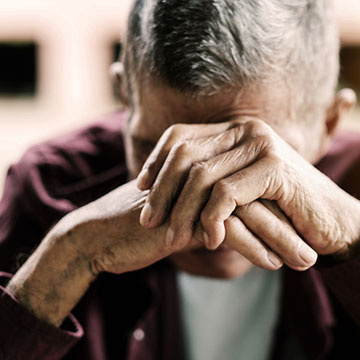How Value-Based Care Helps PCPs Manage Elder Anxiety During COVID-19

Most of my patients are seniors, and they feel exceptionally anxious these days. They worry, of course, about their own health because they are at such high risk for poor outcomes with COVID-19. But they also very selflessly worry about us, their caregivers, and about their children and grandchildren. Many also worry about having enough food, especially when they feel unsafe going out to the store.
This pandemic is a road none of us has traveled. So, I feel privileged to be able to navigate it closely with patients I have gotten to know very well, thanks to our value-based care model. If I were working in a traditional fee-for-service practice, I would perhaps see my patients once or twice a year, and would not have the relationships our model has allowed me to build. Asking my patients to open the door to virtual health, which we have had to implement to keep everyone safe, has been much easier than it would have otherwise been.
Value-Based Care Means Frequent Contact with Patients
So how do I help my patients manage their anxiety when it is best for their health for me not to see them in person? By keeping in very close touch by phone and email and tele-visits.
I have one patient who suffers anxiety at the best of times, so a pandemic and self-isolation is obviously very difficult for her. We’ve scheduled daily appointments to talk about how she is doing, and every day we measure her improvement, both subjectively (how she feels) and objectively (her blood pressure and blood sugar).
The interventions each day are minor, but every day she sees positive results. One day we might set the goal that she will watch a yoga video. Another day it’s to take a one-hour break from watching the news to do something good for herself. On yet another day it’s a goal of taking a daily 20-minute walk outdoors, practicing social-distancing. Not only has she felt better every day, her blood pressure and blood sugar have shown daily improvement.
Another patient badly needs dental work, but his blood pressure, because of the stress of the pandemic, has been really high. He usually deals with stress by going to the gym three to five times a week, and his gym is now closed and he has been afraid to go outside. So I talked to him every couple of days and coached him in distancing techniques to help him walk outside safely for 40 minutes a day. Now his blood pressure is under control and he can get help for his urgent and painful problem with his teeth, which could otherwise lead to more serious systemic problems.
I encourage all of my patients to take frequent breaks from the news. While it is helpful to know what’s going on, excessive news consumption has been shown in studies to exacerbate anxiety. It can also be misleading, and I am often able to help my patients sort out truth from fiction.
Team-Based Care
Working with a team is one of the great joys of value-based care. Members of our team check in with patients weekly to be sure that they have access to the food and medications they need. Our team members then connect patients to vital resources, like Meals on Wheels, pharmacies that make deliveries, and other programs. The team also helps me keep tabs on patients who might not need my immediate care.
Helping Patients Manage Anxiety about Loved Ones
My patients, of course, miss their children and grandchildren, and worry about their family’s health. I think it helps them to be reminded that the best thing we can all do for our extended families is to protect their health, and our own, by not seeing them for a while.
I tell them instead to hold them tight, as closely as they can, just not physically. I suggest they keep in frequent touch by email or by using video platforms like Skype, FaceTime and Zoom. Most of my patients do have internet access. But if they don’t, I recommend frequent visits on the phone. I also suggest that they start writing down recipes and other things they’ve wanted to share with their grandchildren, or plan things to do when this is over. And, as I keep reminding them, it will eventually be over.
Value-Based Care is Preventive Care
Our value-based model is about prevention, and it has been empowering for us as primary care physicians. We know that we have a very significant role in fighting this disease. Our job is to help our patients manage their mental and physical health in the comfort and safety of their homes. And our mission is to do everything we can to keep them out of the hospitals where our colleagues are heroically fighting to keep the sickest among us alive.
If you are interested in being empowered to form real relationships with your patients, explore a position as a ChenMed physician.




